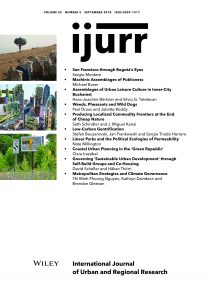This article critically examines the governing of ‘sustainable urban development’ through self‐build cohousing groups in Gothenburg and Hamburg. The two case cities have been selected because both are currently involved in major urban restructuring, and have launched programmes to support self‐build groups and cohousing as part of their emphasis on promoting urban sustainable development through this process. Departing from a theoretical discussion on advanced liberal urban governance, focusing in particular on the contemporary discourse on sustainable urban development, we examine the interaction between political institutions, civil society and private actors in the construction of cohousing as a perceived novel and alternative form of housing that may contribute to fulfilling certain sustainability goals. Questions centre on the socio‐political contextualization of cohousing; concepts of sustainability; strategies of, and relations between, different actors in promoting cohousing; gentrification and segregation; and inclusion and exclusion. In conclusion we argue that, while self‐build groups can provide pockets of cohousing as an alternative to dominant forms of housing, the economic and political logics of advanced liberal urban development make even such a modest target difficult, particularly when it comes to making such housing affordable.
Details
Written by:
David Scheller & Håkan Thörn
Digital Object Identifier (DOI)
10.1111/1468-2427.12652
About DOI

